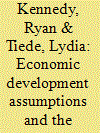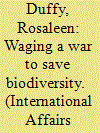|
|
|
Sort Order |
|
|
|
Items / Page
|
|
|
|
|
|
|
| Srl | Item |
| 1 |
ID:
126565


|
|
|
|
|
| Publication |
2013.
|
| Summary/Abstract |
Scholars have argued that oil resources lead to poor quality institutions and governance, which causes slower economic growth, an increased propensity for civil war, and other maladies. Such conclusions, however, rest on strong modernization assumptions that oil resources are unrelated or detrimental to the level of economic development. Utilizing a unique multilevel version of extreme bounds analysis (EBA), we find that oil's deleterious effects on governance are not well established. Instead, when we relax strong assumptions about the exogeneity of economic development and utilize more objective indicators of institutional quality, oil has a net positive impact on governance. Moreover, when accounting for endogeneity, there is little to suggest either an intervening or independent effect of poor governance on civil conflict in petro-states.
|
|
|
|
|
|
|
|
|
|
|
|
|
|
|
|
| 2 |
ID:
127356


|
|
|
|
|
| Publication |
2014.
|
| Summary/Abstract |
Allwars produce their own lessons, but fewwars yield a consensus as towhat those lessons should be. So it is with America's 2003 invasion of Iraq. The immediate consensus surrounding this conflict was that the war was mismanaged and poorly prosecuted. There has been no shortage of books documenting the folly of the Bush administration in this regard.1 Such books often focus on the alleged architects of the Iraq War, from George W. Bush and Dick Cheney to the much maligned neoconservative intellectuals huddled around the Project for a New American Century and writing for the Weekly Standard and Commentary.2 As time has passed, however, there has been a growing body of literature seeking to explain the deeper roots of America's involvement in Iraq. Intellectuals have gone beyond the earliest justifications offered by the Bush administration,which tended to centre on Iraq's quest forweapons ofmass destruction and its alleged ties to terrorist groups. In this burgeoning literature, President Bush, Vice-President Cheney and the neocons are no longer presented as the sole 'villains' of the Iraq War.3
|
|
|
|
|
|
|
|
|
|
|
|
|
|
|
|
| 3 |
ID:
133284


|
|
|
|
|
| Publication |
2014.
|
| Summary/Abstract |
This article examines the rise in militarized approaches towards conservation, as part of a new 'war for biodiversity'. This is a defining moment in the international politics of conservation and needs further examination. The claims that rhinos and elephants are under threat from highly organized criminal gangs of poachers shapes and determines conservation practice on the ground. Indeed, a central focus of the 2014 London Declaration on the Illegal Wildlife Trade is the strengthening of law enforcement, and recent policy statements by the US government and the Clinton Global Initiative also draw the link between poaching, global security and the need for greater levels of enforcement. Such statements and initiatives contribute substantially to the growing sense of a war for biodiversity. This article offers a critique of that argument, essentially by asking how we define poachers, and if militarized approaches mean conservationists are becoming more willing to engage in coercive, repressive policies that are ultimately counterproductive. Further, this article examines how the new war for biodiversity is justified and promoted by referring to wider debates about intervention in a post-Cold War era; notably that the international community has a responsibility towards wildlife, especially endangered species, and that military forms of intervention may be required to save them.
|
|
|
|
|
|
|
|
|
|
|
|
|
|
|
|
| 4 |
ID:
127688


|
|
|
|
|
| Publication |
2014.
|
| Summary/Abstract |
This article provides a new synthesis on the origins of self-management in Yugoslavia on the basis of new archival research. It rejects the dominant view in the historiography that self-management arose merely as an ideological justification for the split with Stalin's USSR in 1948. Rather, it demonstrates that the introduction of workers' councils was part of an elaborate effort on the part of the Communist leadership to return to its pre-1948, proto-'reform Communist' strategy that was remarkably open to interaction with the world market. This is shown to have implications for understanding Yugoslavia, Eastern Europe, the Cold War and Communism.
|
|
|
|
|
|
|
|
|
|
|
|
|
|
|
|
|
|
|
|
|